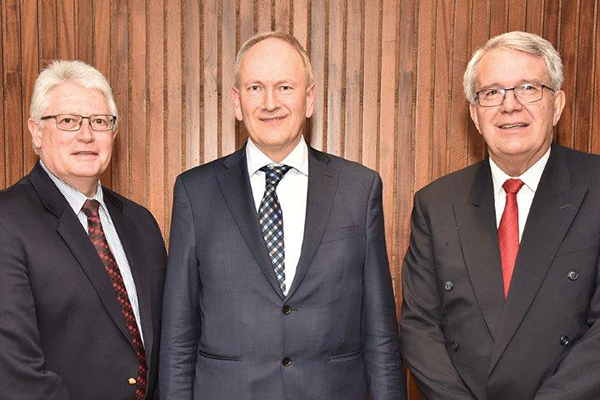Latest News Archive
Please select Category, Year, and then Month to display items
12 January 2024
|
Story Nonsindiswe Qwabe
|
Photo Sonia Small
 Since joining the UFS in 2008, Dr Grey Magaiza has worked extensively on approaches that can foster the socio-economic transformation of societies.
Since joining the UFS in 2008, Dr Grey Magaiza has worked extensively on approaches that can foster the socio-economic transformation of societies.
“The future should be one where communities can decide on their development agenda and futures. That’s the most important for me.” Dr Grey Magaiza, Deputy Director of the Centre for Gender and Africa Studies (CGAS) and Head of the Community Development programme on the Qwaqwa Campus, is passionate about capacitating communities to be agents of change and advancement. His vision for the future emphasises the empowerment of communities to take charge of their development by actively participating in decision making and the implementation of development projects that can improve their lives.
Since joining the UFS in 2008, Dr Magaiza has worked extensively on approaches that can foster the socio-economic transformation of societies. Over the years, he has crafted his research speciality into one that he is most proud of – being an interdisciplinary scientist immersed in the development of communities.
“I’m in a fortunate position of researching what I like. I say ‘fortunate’, because I’ve taken the time to understand what I’m passionate about, which is the overall field of rural livelihoods and livelihood futures – in short, community development. My research starts from an engaged university, understanding the elements that a university must use to enhance transformation and relevance to its immediate community in terms of development.”
One of the ways he has done this is by looking at social entrepreneurship as a development approach for young people in a rural setting. Through workshops with non-profit and civic organisations in Qwaqwa, Dr Magaiza has been helping these organisations to map out their needs and actively meet them through the involvement and support of external role players.
“We understand that communities are part of the national development agenda, but even that national agenda respects community knowledge and intentions and allows communities to shape their identity. A critical enabler of this is community organising. You bring back the capacity in communities to have dialogues on issues affecting them as spaces for engagement, knowledge exchange, and for people to just talk about their way forward.”
By enabling communities to define their development agenda, they can address their specific needs, challenges, and aspirations, he said. “When I look at livelihood futures, it’s quite an exciting aspect of my work – it’s like looking into a fortune tellers’ globe, because you’re not deciding for communities what they should do, but the communities themselves take those decisions.”
Tutu-Jonker Prestige Lecture Series tackles reconciliation
2017-11-13

Prof Rian Venter; Prof Eddy van der Borght, guest speaker from Vrije
Universiteit, Amsterdam; and Prof Fanie Snyman, Dean of the Faculty
of Theology and Religion at the UFS.
Photo: Supplied
The Faculty of Theology and Religion recently hosted the annual Tutu-Jonker Prestige Lecture Series at the Bloemfontein Campus of the University of the Free State (UFS). The purpose of the lecture series is to address modern-day and pressing social challenges from a theological and religious perspective.
With the theme Religions and reconciliation of conflicting identities, guest speaker and Desmond Tutu Chair on reconciliation at the Faculty of Theology: Vrije Universiteit Amsterdam, Prof Eddy van der Borght, spoke about the reformation in the context of shifting European identity formations.
Reconciliation versus social identity
“My focus is on what the Christian concept of reconciliation means for reconciliation in society,” said Prof Van der Borght. He deliberated the global problem of conflict generated by diverse social identities. He also emphasised that religion has huge resources to contribute towards overcoming conflicting identities.
“The theory is that religions know about reconciliation, while in practice it is much more complicated, because often religions are part of the problem of conflict,” he says. He said religions are often the problem in social cultural identities, especially regarding conflict involving different nations, racial, and ethnic groups.
Honouring prominent theologians Tutu and Jonker
The name Tutu-Jonker originates from the two theologians, Emeritus Archbishop Desmond Tutu and the late Prof Willie Jonker, who are both regarded as prominent theologians known for their emphasis on reconciliation in South Africa. The significance of combining the two names is said to bring together two different theological traditions (Anglican and Reformed), cultural groups, and races.
Prof Fanie Snyman, Dean of the Faculty of Theology and Religion, said, “This will also serve the purpose of a welcoming culture at the faculty, embracing diversity and embodying reconciliation.” Both of these theologians received honorary doctorates in Theology from the UFS.